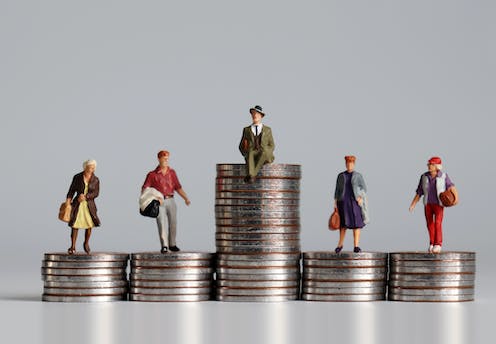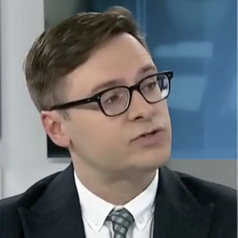Nearly half of Canadian workers feel as though the economic conditions in Canada are “poor,” according to our survey of 2,500 Canadian workers in September of 2023. And another 38 per cent said they believed economic conditions are “only fair.”
These findings are unsurprising, given the poor state of the Canadian economy and the growing pessimism among Canadians toward it. Inflation and interest rates both remain high, and job openings are struggling to keep up with the growing labour force.
We have tracked perceived inequality since September of 2019, when we launched the first in a series of national surveys with the help of the Angus Reid Group.
We subsequently fielded similar surveys each September from 2020 to 2023, with a total of 18,500 participants in our University of Toronto Canadian Quality of Work and Economic Life Study. One goal of our study is to track long-term trends in the economic life of Canadians.
Canadians’ view of inequality
Perceived inequality is difficult to measure, so we used a well-established method that researchers have used for decades in the International Social Survey Programme’s Social Inequality Module.
This method includes showing survey participants images and descriptions of five types of societies that each represent different levels of inequality, and asking them which diagram they believe best represents their country.
In our survey, we showed respondents a diagram of the five types and asked them: “Which type of society is Canada today — which diagram comes closest?”
Type A represents the most extreme inequality, with a small elite at the top, few people in the middle and most people at the bottom. Between 1999 and 2019, the International Social Survey found no change in the share of respondents — 19 per cent — that believed Canada resembles Type A. But in our 2023 survey, 32 per cent believed it did.
The share that saw Canada as a middle-class society (Type D) plummeted from 29 per cent to 16 per cent. There has been a dramatic shift in the perception of increasing inequality, with 64 per cent seeing Canada as Type A or B.
When we asked participants what they think Canada should be like, 84 per cent prefer a Type D or E society, where most of society are middle- or upper-class. The difference between the stability in this preferred level of inequality compared to the volatility of the perceived reality is noteworthy.
The cost of living and perceived inequality
The factors that shape perceived inequality are complex, but its relationship to the perceived cost of living stands out.
To measure this relationship we asked participants: “How has your experience of the cost of living changed during the past few years?” The number of Canadian workers who said their experience was “much worse” jumped from 28 per cent in 2019 to 49 per cent in 2023.
“We’re so careful with our money,” a 31-year-old operations assistant told us. “Housing, food, utilities and fuel are becoming too astronomical to handle — we shouldn’t be suffering!”

Perceptions of extreme inequality undermine people’s belief that the economy is working for them. (Shutterstock)
Anxiety over the cost of living can cause people to feel like economic inequality is worse than it actually is. In 2019, 27 per cent of respondents who believed Canada’s cost of living was worsening viewed the country as a Type A society with a small elite at the top and most people at the bottom. Now, a whopping 41 per cent do.
“Everyone I know has been cutting purchases,” a 59-year-old delivery worker said. “I haven’t purchased undergarments for five years, toiletries for three years, and I’m only able to eat one meal a day, not extras of anything.”
Canadians are disillusioned
Our discoveries support a recent report from Léger, a Canadian market research firm, that found two-thirds of Canadians feel like “everything feels broken in this country right now.”
As a 37-year-old mortgage administrator said: “The country’s system is rigged in favour of the few at the expense of the many.” A 36-year-old photographer similarly said: “Our broken tax system allows folks at the top to exploit the system.”
The economy relies on worker productivity, and workers rely on the reciprocity of the economy. It’s an exchange relationship that seems increasingly compromised, as workers are being hit hardest by inflation.
Perceptions of extreme inequality undermine people’s belief that the economy is working for them. This, in turn, dampens their aspirations to improve their economic lot and weakens the hope that their efforts will translate into improved quality of life.
“Our leaders don’t do anything,” a 34-year-old personal trainer said. “I have zero faith in our political parties.” Similarly, a 47-year-old small farm owner said: “The elite of all parties rob, steal, and abuse power for personal benefit, leaving the working class to pay.”
Those in power should be concerned about the growing gap between perceived and preferred inequality. For instance, many Canadians have lost faith in the Liberal party’s campaign promise to grow the middle class. This loss of confidence poses a threat to the Liberal party’s chances of re-election.



 Vietnam’s Trade Surplus With US Jumps as Exports Surge and China Imports Hit Record
Vietnam’s Trade Surplus With US Jumps as Exports Surge and China Imports Hit Record  Nikkei 225 Hits Record High Above 56,000 After Japan Election Boosts Market Confidence
Nikkei 225 Hits Record High Above 56,000 After Japan Election Boosts Market Confidence  Asian Stocks Slip as Tech Rout Deepens, Japan Steadies Ahead of Election
Asian Stocks Slip as Tech Rout Deepens, Japan Steadies Ahead of Election  RBI Holds Repo Rate at 5.25% as India’s Growth Outlook Strengthens After U.S. Trade Deal
RBI Holds Repo Rate at 5.25% as India’s Growth Outlook Strengthens After U.S. Trade Deal  U.S.-India Trade Framework Signals Major Shift in Tariffs, Energy, and Supply Chains
U.S.-India Trade Framework Signals Major Shift in Tariffs, Energy, and Supply Chains  Trump Signs Executive Order Threatening 25% Tariffs on Countries Trading With Iran
Trump Signs Executive Order Threatening 25% Tariffs on Countries Trading With Iran  Gold and Silver Prices Climb in Asian Trade as Markets Eye Key U.S. Economic Data
Gold and Silver Prices Climb in Asian Trade as Markets Eye Key U.S. Economic Data  Japan Economy Poised for Q4 2025 Growth as Investment and Consumption Hold Firm
Japan Economy Poised for Q4 2025 Growth as Investment and Consumption Hold Firm  Asian Markets Surge as Japan Election, Fed Rate Cut Bets, and Tech Rally Lift Global Sentiment
Asian Markets Surge as Japan Election, Fed Rate Cut Bets, and Tech Rally Lift Global Sentiment  Yen Slides as Japan Election Boosts Fiscal Stimulus Expectations
Yen Slides as Japan Election Boosts Fiscal Stimulus Expectations  Dollar Near Two-Week High as Stock Rout, AI Concerns and Global Events Drive Market Volatility
Dollar Near Two-Week High as Stock Rout, AI Concerns and Global Events Drive Market Volatility  Japanese Pharmaceutical Stocks Slide as TrumpRx.gov Launch Sparks Market Concerns
Japanese Pharmaceutical Stocks Slide as TrumpRx.gov Launch Sparks Market Concerns  Global Markets Slide as AI, Crypto, and Precious Metals Face Heightened Volatility
Global Markets Slide as AI, Crypto, and Precious Metals Face Heightened Volatility  Australian Pension Funds Boost Currency Hedging as Aussie Dollar Strengthens
Australian Pension Funds Boost Currency Hedging as Aussie Dollar Strengthens 


































